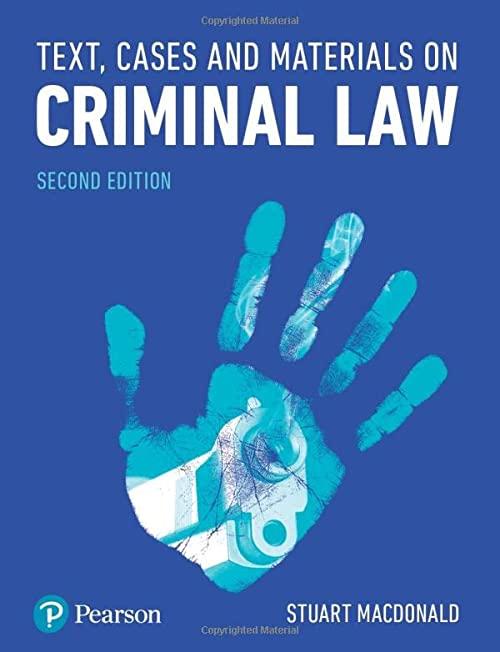Question
On January 19, 1976, a sworn complaint was filed against Edwards in Arizona state court charging him with robbery, burglary, and first-degree murder. An arrest
On January 19, 1976, a sworn complaint was filed against Edwards in Arizona state court charging him with robbery, burglary, and first-degree murder. An arrest warrant was issued pursuant to the complaint, and Edwards was arrested at his home later that same day. At the police station, he was informed of his rights as required by Miranda v. Arizona, 384 U.S. 436, 86 S.Ct. 1602, 16 L.Ed.2d 694 (1966). Petitioner stated that he understood his rights, and was willing to submit to questioning. After being told that another suspect already in custody had implicated him in the crime, Edwards denied involvement and gave a taped statement presenting an alibi defense. He then sought to "make a deal." The interrogating officer told him that he wanted a statement, but that he did not have the authority to negotiate a deal. The officer provided Edwards with the telephone number of a county attorney. Edwards made the call, but hung up after a few moments. Edwards then said: "I want an attorney before making a deal." At that point, questioning ceased and Edwards was taken to county jail.
At 9:15 the next morning, two detectives, colleagues of the officer who had interrogated Edwards the previous night, came to the jail and asked to see Edwards. When the detention officer informed Edwards that the detectives wished to speak with him, he replied that he did not want to talk to anyone. The guard told him that "he had" to talk and then took him to meet with the detectives. The officers identified themselves, stated they wanted to talk to him, and informed him of his Miranda rights. Edwards was willing to talk, but he first wanted to hear the taped statement of the alleged accomplice who had implicated him. After listening to the tape for several minutes, Edwards said that he would make a statement so long as it was not tape-recorded. The detectives informed him that the recording was irrelevant since they could testify in court concerning whatever he said. Edwards replied: "I'll tell you anything you want to know, but I don't want it on tape." He thereupon implicated himself in the crime.
Prior to trial, Edwards moved to suppress his confession on the ground that hisMiranda rights had been violated when the officers returned to question him after he had invoked his right to counsel. The trial court initially granted the motion to suppress, but reversed its ruling when presented with a supposedly controlling decision of a higher Arizona court. The court stated without explanation that it found Edwards' statement to be voluntary. Edwards was tried twice and convicted. Evidence concerning his confession was admitted at both trials.
On appeal, the Arizona Supreme Court held that Edwards had invoked both his right to remain silent and his right to counsel during the interrogation conducted on the night of January 19. The court then went on to determine, however, that Edwards had waived both rights during the January 20 meeting when he voluntarily gave his statement to the detectives after again being informed that he need not answer questions and that he need not answer without the advice of counsel: "The trial court's finding that the waiver and confession were voluntarily and knowingly made is upheld."
Applying what you have learned this week about Miranda and the distinct rights that apply you are to answer the following question:
Based on Mr. Edwards reasons for ending the first interview, is his confession to the crime admissible in court? Explain your reasoning.
Step by Step Solution
There are 3 Steps involved in it
Step: 1

Get Instant Access to Expert-Tailored Solutions
See step-by-step solutions with expert insights and AI powered tools for academic success
Step: 2

Step: 3

Ace Your Homework with AI
Get the answers you need in no time with our AI-driven, step-by-step assistance
Get Started


